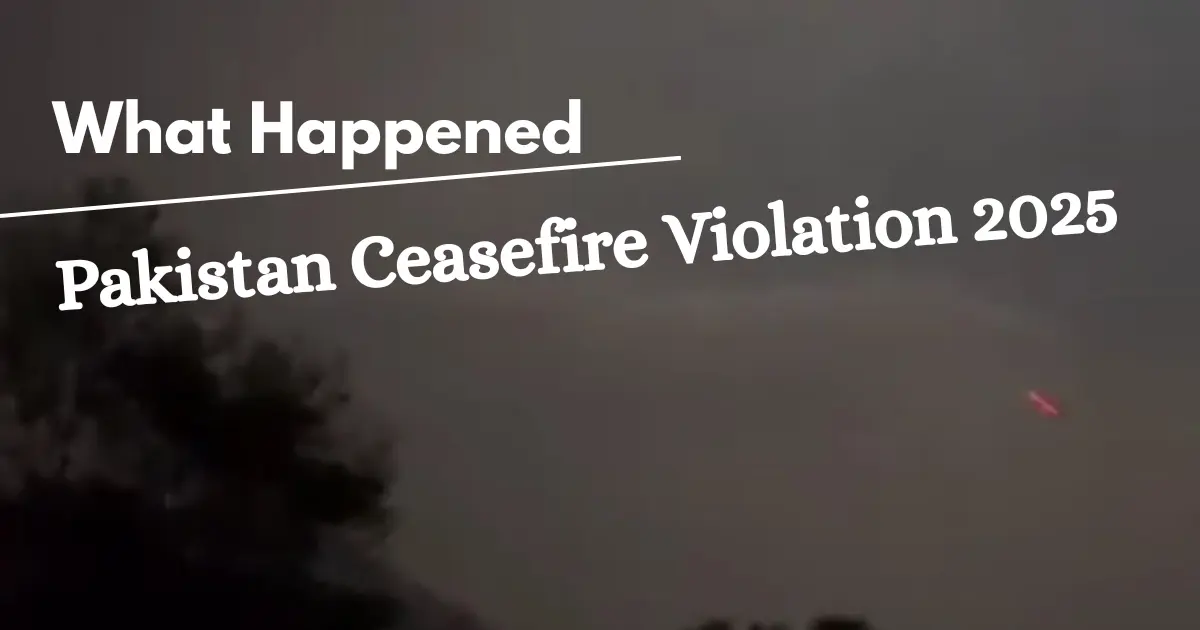May 10, 2025 | New Delhi, India
Pakistan has violated a freshly brokered ceasefire agreement by launching suicide drone attacks on the Jammu region of India, reigniting tensions in the volatile Kashmir region. The attacks, which occurred just hours after a US-mediated truce, have raised concerns about escalating conflict between the two nuclear-armed neighbors. This development comes shortly after former US President Donald Trump announced his role in mediating the ceasefire, a claim India has since downplayed.
What Happened: Pakistan Ceasefire Violation 2025
On the night of May 10, 2025, explosions rocked the Jammu region in Indian-administered Kashmir, with witnesses reporting multiple blasts near Srinagar airport and other areas along the Line of Control (LoC). Local authorities confirmed that Pakistan deployed suicide drones in the attack, targeting strategic locations close to the heavily militarized border. According to The Guardian, no casualties were reported, but debris from intercepted drones was recovered from densely populated neighborhoods in Jammu.
The violation follows a series of drone attacks on Thursday night, where India accused Pakistan of deploying up to 400 drones to target cities, military bases, and places of worship across northern India, including Punjab and Rajasthan. A post on X by @TrumpUpdateHQ stated, “BREAKING: 🇵🇰 Pakistan has deployed suicide drones targeting the Jammu region of India, violating the recently established ceasefire agreement.” This rapid escalation has alarmed residents and officials alike, with air raid sirens and blackouts reported in parts of Jammu and Kashmir (Hindustan Times).
Donald Trump’s Mediation: Ceasefire Agreement Under Scrutiny
Earlier on May 10, 2025, a ceasefire agreement was announced between India and Pakistan, following days of cross-border violence that claimed dozens of lives. The truce was reportedly facilitated through international mediation, with Donald Trump claiming a central role. In a statement on Truth Social, Trump said, “After a long night of talks mediated by the United States, I am pleased to announce that India and Pakistan have agreed to a full and immediate ceasefire. Congratulations to both countries on using common sense and great intelligence.”
However, India’s Foreign Secretary Vikram Misri clarified that the agreement was negotiated directly between the two nations, with no mention of US mediation (India Today). The ceasefire, effective from 5 PM on May 10, 2025, aimed to halt all military actions on land, air, and sea. Both countries were set to begin broader talks on May 12 at a neutral site to address underlying issues, including the long-standing Kashmir conflict.
India-Pakistan Conflict 2025: A Fragile Peace
The ceasefire violation underscores the fragility of peace between India and Pakistan, particularly in the disputed Kashmir region. The LoC has been a flashpoint for decades, with both nations accusing each other of aggression. On May 6, India launched “Operation Sindoor,” targeting alleged militant sites in Pakistan and Pakistan-administered Kashmir, further escalating tensions (Council on Foreign Relations).
The recent Jammu drone attacks have drawn sharp reactions. On X, users expressed frustration, with @BawaaliShots commenting, “Porkistan is like dog’s tail it can’t be straight. #CeasefireViolation.” Others criticized the depiction of disputed territories in maps shared online, calling for greater sensitivity to the Kashmir issue.
Global Reactions and Implications
The international community, including the US and European nations, has expressed concern over the rapid violation of the ceasefire. While the truce was initially welcomed as a step toward de-escalation, Pakistan’s actions have cast doubt on the prospects for peace. India has responded by placing its Border Security Force (BSF) on high alert, with instructions to retaliate with full force (India Today).
For US and European audiences, the India-Pakistan conflict 2025 raises broader questions about regional stability and the role of international mediation. The Kashmir conflict, which dates back to 1947, remains a complex issue with global implications, particularly given the nuclear capabilities of both nations.
What’s Next?
As India and Pakistan prepare for talks on May 12, the focus will be on ensuring accountability and preventing further violations. For now, the people of Jammu and Kashmir remain on edge, caught in the crossfire of a decades-long conflict. The international community, including the US and European nations, will be watching closely as this situation unfolds.
